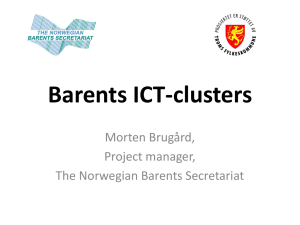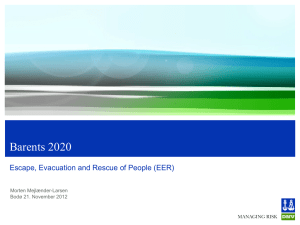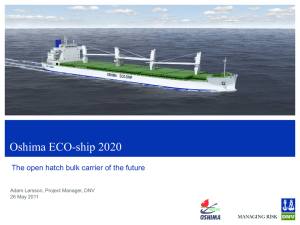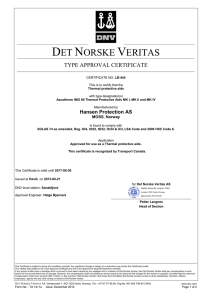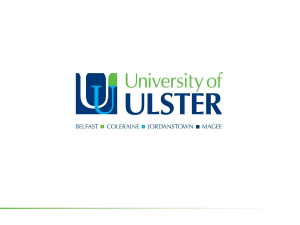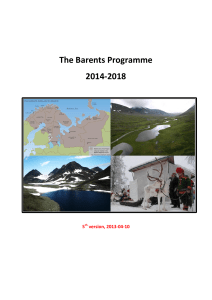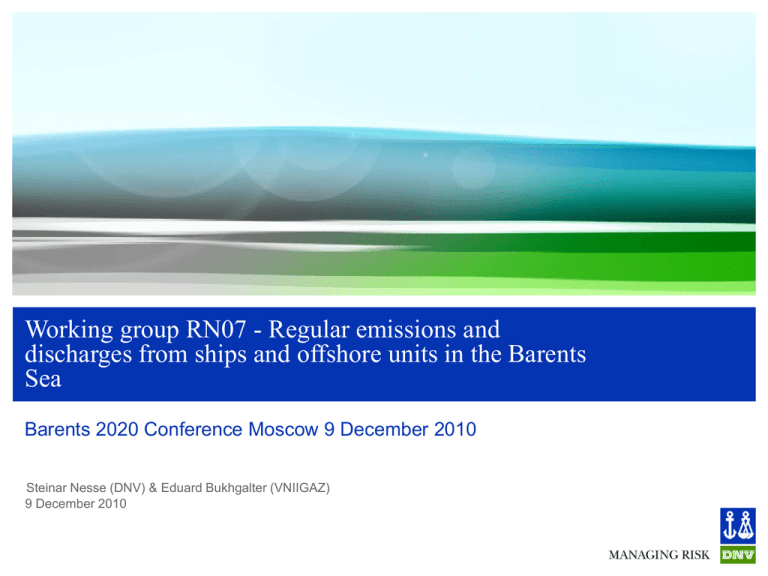
Working group RN07 - Regular emissions and
discharges from ships and offshore units in the Barents
Sea
Barents 2020 Conference Moscow 9 December 2010
Steinar Nesse (DNV) & Eduard Bukhgalter (VNIIGAZ)
9 December 2010
Outline
Brief overview of Phase 3 scope and main results (RN07)
Mandate Phase 4 (RN07)
Approach
Status of progress
Further work and milestones
Barents 2020 Phase 4 - Working group RN07
9 December 2010
© Det Norske Veritas AS. All rights reserved.
2
Experts RN07 Phase 4
Russian experts
Norwegian/International experts
Eduard Bukhgalter, VNIIGAZ (Russian coordinator)
Knut Aasnes, Statoil
Elena Ilyakova, VNIIGAZ
Svein Flornes, Transocean
Nicolay Valdman, Krylov institute
Axel Kelley, Eni Norge
Vadim Kharitonov, Giprospetsgaz
Haakon Hustad, DNV
Аlexander Schvyrjajev, Lomonosov MSU
Salve Dahle, Akvaplan-NIVA
Alexander Kichigin, Gazprom
Yuri Alexandrovski, SDAG
Nikolay Shaplov, Rosneft
Frederic Hannon, OGP/TOTAL
Natalia Kutaeva, FSO "State marine rescue service of
Russia“ (observer)
Gina Ytteborg, OGP/Shell
Anna Savina, ANO "Industrial Risk Agency” (observer)
Barents 2020 Phase 4 - Working group RN07
9 December 2010
© Det Norske Veritas AS. All rights reserved.
3
Steinar Nesse, DNV
Scope of work for working group RN07 (phase 3)
Baseline
studies
Seismic acquisition
Decommissioning
Onshore waste
reception and
infrastructure
Exploration drilling,
product. drilling
Standards for
operational
emissions and
discharges to air
and water
Tanker export
Design
Supply services
Subsea development
Environmental
monitoring
Production
Pipeline
commissioning
Field
development
Barents 2020 Phase 4 - Working group RN07
9 December 2010
© Det Norske Veritas AS. All rights reserved.
4
Phase 3 RN07 main results:
Recommended standards for reference, offshore oil & gas
ISO 14001:2004 Environmental Management System
- The ISO 14001 implies that activities are planned for and executed
in a systematic manner considering relevant environmental aspects
and aiming at continuous improvement.
International Finance Corporation / World bank Group
Environmental, Health, and Safety Guidelines:
- Offshore Oil and Gas Development (2007)
-
Air Emissions
Wastewaters
Waste management
Hazardous Materials Management
Noise
Decommissioning
- Ambient Air Quality (2007)
NORSOK S-003 Environmental Care (2005)
OGP waste management guidelines with special
focus on areas with limited infrastructure (2009)
Barents 2020 Phase 4 - Working group RN07
9 December 2010
© Det Norske Veritas AS. All rights reserved.
5
Phase 3 RN07 main results:
Recommended standards for reference, maritime
IMO MARPOL 73/78 Annexes with amendments
- Annex I. Prevention of pollution by oil
- Annex II. Control of pollution by noxious liquid substances
- Annex III. Prevention of pollution by harmful substances in
packaged form
- Annex IV. Prevention of pollution by sewage from ships
- Annex V. Prevention of pollution by garbage from ships
- Annex VI. Prevention of air pollution from ships
IMO Ballast water Convention
IMO Antifouling Convention
Barents 2020 Phase 4 - Working group RN07
9 December 2010
© Det Norske Veritas AS. All rights reserved.
6
Phase 3 RN07 main results:
Recommendation for new and stricter environmental standards
Development of regional Industry Standard to reflect
MARPOL Special Area (SA) requirements on relevant
issues for petroleum related ship traffic (oil, garbage)
Develop of regional Industry Standard for ships and
offshore installations to work on lighter fuels, instead
of heavy grade fuels
New standard for the reduction of burning of liquids in
the proximity to ice covered areas
New standard for underwater noise from maritime
vessels
Barents 2020 Phase 4 - Working group RN07
9 December 2010
© Det Norske Veritas AS. All rights reserved.
7
Phase 3 RN07 main results:
Recommendation for further harmonization in 2010
Harmonised standard for pollution detection
Harmonised standard for offshore environmental
monitoring for the Barents Sea
Joint seminars of Russia and Norway on specific
international issues of environmental monitoring
Waste Management – further development and
harmonisation
Further work on harmonisation on chemicals
management
Further harmonization on recommended
discharge/emissions levels
Barents 2020 Phase 4 - Working group RN07
9 December 2010
© Det Norske Veritas AS. All rights reserved.
8
Mandate RN07 Phase 4
Specify and propose a regional standard for regular emissions and discharges from
ships and offshore units in the Barents Sea, including applying the MARPOL Special
Area (SA) requirements
Barents 2020 Phase 4 - Working group RN07
9 December 2010
© Det Norske Veritas AS. All rights reserved.
9
Approach RN07 Phase 4
Barents 2020
Phase 3
Report
− International reference
standards
− Suggested changes
to existing standards
− New standards
Technical framework
Documents (5)
August – December 2010
Barents 2020
Phase 4
Mandate
− Regular emissions to air
− Regular discharges to sea
− Waste management
− MARPOL SA requirements
− Environmental control and
monitoring
January – May 2011
Produce a regional
environmental
industry standard
by end 2011
Barents 2020 Phase 4 - Working group RN07
9 December 2010
© Det Norske Veritas AS. All rights reserved.
Further technical
harmonisation
10
Status of progress
Developed Technical framework documents (TFD):
-
Regular emissions to air
Regular discharges to sea
Environmental monitoring and control
Waste management
MARPOL Special Area issues
Purpose of the TFDs: To establish a common basis and scope for
development of the environmental standard, i.e.
- Present, discuss and agree on reference standards, issues, parameters,
levels and limits.
Draft TFDs developed by International/Norwegian experts mid
October 2010
Translated to Russian language and distributed
Commented on by Russian experts
Discussed at RN07 meeting in Moscow 7 December
Barents 2020 Phase 4 - Working group RN07
9 December 2010
© Det Norske Veritas AS. All rights reserved.
11
Regular emissions to air, examples
Soot/black carbon - Fuel quality
Sulphur contents in fuels (MARPOL; North Sea 0.1% from 2015, IFC/WB, NORSOK
S-003)
NOX (MARPOL – NOx curve Tier II, IFC/WB; 25 ppm gas turbine)
nmVOC; loading operations (harmonization)
Emissions reduction technologies
Barents 2020 Phase 4 - Working group RN07
9 December 2010
© Det Norske Veritas AS. All rights reserved.
12
Discharges to sea, examples
MARPOL Special Area requirements for petroleum associated maritime vessels:
- Garbage (incl. food waste in areas with ice) ”0”,
- Oil ”0”; SA has 0 discharge for slop and 15 ppm for bilge, Antarctica SA 0 also for bilge
Offshore oil & gas activities;
- IFC/WB Environmental, Health, and Safety Guidelines for Offshore Oil and Gas
Development (2007) forms the basis, ”minimum standard”
- S-003 Environmental care; design
- Harmonise with new Russian environmental regulation (2010)
Parameters to be harmonised (e.g. natural components in PW and added
chemicals), and aligned with environmental monitoring
Barents 2020 Phase 4 - Working group RN07
9 December 2010
© Det Norske Veritas AS. All rights reserved.
13
Environmental measurement, monitoring and control
Definition clarification:
1. Monitor effluent streams (discharge to sea) and emission streams (emissions to
air)
2. Monitor concentration and contaminant level in external environment (water
column, seabed sediment, fish, ice)
3. Monitor biological effects (e.g. benthic fauna diversity)
1
2
1
2
2
3
2
Barents 2020 Phase 4 - Working group RN07
9 December 2010
© Det Norske Veritas AS. All rights reserved.
14
Environmental measurement, monitoring and control (2)
Today different regimes in Russia and Norway, and different
bodies responsible for execution of monitoring (industry,
authorities):
Phase 3: “..the Russian monitoring standards are not in depth
aligned with offshore conditions, and the Norwegian system
needs some development to apply with the Barents Sea
conditions (e.g. for ice covered areas). A harmonized system will
ensure transparence in monitoring environmental performance
(impacts) and facilitate transparence in data exchange and
improve opportunity for joint problem solving.”
Establish harmonised list of parameters (pollutants), frequency
and scope of monitoring
Establish harmonised methods for monitoring based on
internationally approved standards for measurement, analyzes
and reporting
Barents 2020 Phase 4 - Working group RN07
9 December 2010
© Det Norske Veritas AS. All rights reserved.
15
Waste management, example
Basis;
Waste management hierarchy
-
Remove and reduce
Reuse
Recycling/recovery
Residue treatment
Dispose
Ships: MARPOL Annex V, waste management plans
Offshore oil & gas; OGP guidelines (2009), waste
management plans, waste collection, segregation and
storage
EU Hazardous waste classification list
Barents 2020 Phase 4 - Working group RN07
9 December 2010
© Det Norske Veritas AS. All rights reserved.
16
Further work and milestones RN07 Phase 4
Work in dedicated (sub-)groups to develop the adequate technical level of standard
per environmental task
- Based on international/Norwegian standards and experiences
- Harmonized and aligned with Russian standards and practices
- May 2011 expert meeting
Compile report and send it for review
- September 2011 expert meeting
Finalise report and present results to the 2011 Barents 2020 conference
Barents 2020 Phase 4 - Working group RN07
9 December 2010
© Det Norske Veritas AS. All rights reserved.
17
Safeguarding life, property
and the environment
www.dnv.com
Barents 2020 Phase 4 - Working group RN07
9 December 2010
© Det Norske Veritas AS. All rights reserved.
18

